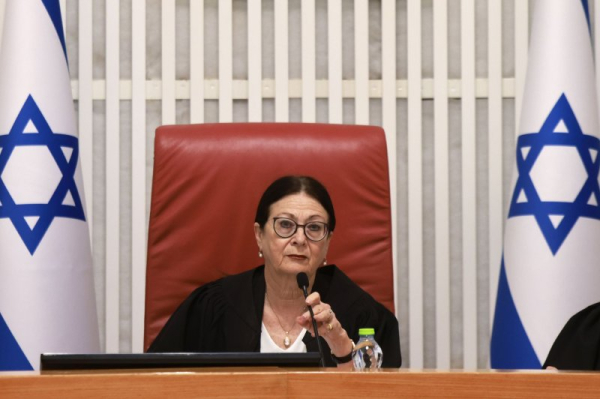
1 of 3 | The Israeli Supreme Court on Thursday heard challenges to a law raising the legal threshold that is required to remove a sitting prime minister from office. Pool Photo by Menahem Kahana/UPI | License Photo
Israel’s Supreme Court began hearing arguments challenging a controversial law that raises the legal threshold that is required to remove a sitting prime minister from office.
The law in question before the High Court of Justice was widely seen as an effort by the hardline government to insulate Prime Minister Benjamin Netanyahu while he was on trial for corruption. In exchange, he promised to refrain from any interference in judicial proceedings pertaining to his legal case. Advertisement
Opposition party members have called on the court to dismiss the country’s Incapacitation Law, which was passed after Netanyahu’s latest rise to power in late 2022 in an effort to limit the court’s power to remove him from office.
The law allows for a prime minister to remain in power unless declared incapacitated due to a mental or physical health issue. Advertisement
As the hearing began Thursday, coalition leaders in Netanyahu’s government accused the high court of interfering with Netanyahu’s election win by agreeing to take up the challenge to the law.
The court’s 11 justices previously indicated they were leaning toward approving an amendment to the law, but would also postpone its final enactment until the next election to prevent Netanyahu from using it to stay in power.
“The hearing being held today in the court is in practice a hearing to cancel the results of the elections,” Justice Minister Yariv Levin said Thursday in the Knesset. “The meaning of postponing the applicability of the Incapacitation Law is that an official, no matter how senior, can take for themself the authority, which was never given to them, to debate the ridiculous possibility of declaring a prime minister incapacitated in complete opposition to the results of the elections … They failed at the ballots and are now requesting to cancel the results of the election.”
After taking office in late 2022, Netanyahu enacted a number of hardline policies that have increased tensions with the United States while increasing instability in the region. The case comes after Netanyahu introduced a controversial proposal to overhaul the country’s judiciary earlier this year, which sparked massive protests across the country. Advertisement
Meanwhile Thursday, attorneys for Netanyahu defended the law, and warned that delaying its implementation would “leave open the option of a head-on collision between the branches of government, the option of the trampling of the Knesset.”
Cabinet members also continued to voice support for Netanyahu’s ongoing upheaval efforts and blasted the court for working to diminish his power to do so.
“The people had their say in the election, and officials cannot cancel the choice of the people,” said Finance Minister Bezalel Smotritch. “Judges cannot cancel basic laws, and they definitely cannot invent for themselves or for the attorney-general the authority to dismiss an elected prime minister. This is the truth, and the rest is a terrible and invalid show.”
The legal controversy comes more than a week after President Joe Biden met with Netanyahu in New York for the first time since tensions first emerged over Netanyahu’s efforts to overhaul Israel’s judiciary.
The two leaders reaffirmed their bond over democratic values, vowed to improve Middle East relations and planned to meet again in Washington, D.C. following months of strained relations due to the hardline crackdown by Washington’s main ally in the Middle East. Advertisement